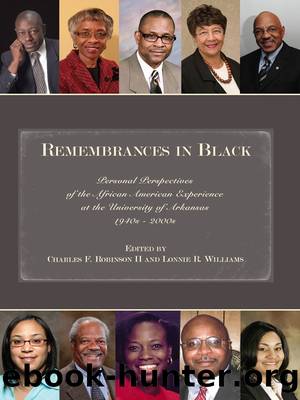Remembrances in Black by Charles F. Robinson II Lonnie R. Williams

Author:Charles F. Robinson II, Lonnie R. Williams [Charles F. Robinson II, Lonnie R. Williams]
Language: eng
Format: epub
Tags: Social Science, General, Education, Higher, Ethnic Studies, African American Studies
ISBN: 9781557286758
Google: qh9LCgAAQBAJ
Publisher: University of Arkansas Press
Published: 2015-02-20T05:36:32+00:00
Patricia L. Greene Griffen (1972â1974, 1976â1978), psychologist
Written response to interview questions, October 14, 2008
For detailed biography, see Appendix A, page 309
I enrolled at the University of Arkansas in August 1972 because it offered the degree plan I wanted in clinical psychology. At that time, the psychology department actively recruited black graduate students as a result of the work of the National Association of Black Psychologists. There were three black graduate students admitted that year, Daphne Morris, Natalie Dyer, and myself. The following semester, spring 1973, the university hired the first black faculty member in the Department of Psychology, Dr. Brenda Mobley.
I attended the university from August 1972 through December 1974 and September 1976 to 1978. To my knowledge, I was the first black student to complete the PhD in clinical psychology. Before, there had been one black male to complete the masterâs degree.
Having grown up in central Arkansas and completed my undergraduate degree in the same area, I was initially confronted with culture shock. The department was supportive, yet struggled with understanding and relating to students of color. This was true for both faculty and students. Efforts were made through social events to reduce those barriers. Because I was in graduate school, most of my activities involved academic affairs and departmental interactions. There were opportunities to interact with black students, both graduate and undergraduate from other areas. The black students were very progressive minded, bright, and visionary. Interactions with the black students were very stimulating intellectually. I made friends that have lasted a lifetime from the time spent at the University of Arkansas.
During my time of study, I had mixed emotions due to the lack of racial progress at the university. There was an obvious cultural/racial/ethnic divide combined with insensitivity to closing the gap. Furthermore, there was a blatant lack of knowledge about blacks on the part of whites. There were instances when I witnessed blacks being treated as an anomaly at the graduate level. I also realized that this was the first time most Caucasians had close interactions with blacks.
I returned to the university to serve as a panelist when the psychology department celebrated its silver anniversary. I have also attended a few of the black student reunions as well as other events on campus. I have not been on campus recently.
I have been disappointed that the gains made during the 1970s have not lasted within the Department of Psychology. To my knowledge, there are no black faculty members nor black students currently in the department. Cultural incompetence continues to exist in a field of study designed to address the psychological/emotional needs of all individuals. With Arkansas becoming more racially and culturally diverse, it is disappointing that the institution for higher education in Arkansas is not more instrumental in equipping professionals to meet the needs of its diverse citizenry. It seems as if the department has regressed.
The area of clinical psychology has always been highly competitive to enter at the graduate level. As a result of the National Association
Download
This site does not store any files on its server. We only index and link to content provided by other sites. Please contact the content providers to delete copyright contents if any and email us, we'll remove relevant links or contents immediately.
Navigation and Map Reading by K Andrew(4553)
Spare by Prince Harry The Duke of Sussex(4198)
Tuesdays with Morrie by Mitch Albom(3832)
Cracking the GRE Premium Edition with 6 Practice Tests, 2015 (Graduate School Test Preparation) by Princeton Review(3596)
What It Really Takes to Get Into Ivy League and Other Highly Selective Colleges by Hughes Chuck(3221)
Goodbye Paradise(2963)
Never by Ken Follett(2880)
Pledged by Alexandra Robbins(2790)
Kick Ass in College: Highest Rated "How to Study in College" Book | 77 Ninja Study Skills Tips and Career Strategies | Motivational for College Students: A Guerrilla Guide to College Success by Fox Gunnar(2720)
A Dictionary of Sociology by Unknown(2518)
Graduate Admissions Essays, Fourth Edition: Write Your Way into the Graduate School of Your Choice (Graduate Admissions Essays: Write Your Way Into the) by Asher Donald(2476)
Sapiens and Homo Deus by Yuval Noah Harari(2414)
Get into Any College by Tanabe Gen Tanabe Kelly(2384)
Zero to Make by David Lang(2348)
The Social Psychology of Inequality by Unknown(2311)
Machine Learning at Scale with H2O by Gregory Keys | David Whiting(2291)
500 Must-Know AP Microeconomics/Macroeconomics Questions(2241)
Fairy Tale by Stephen King(2070)
Will by Will Smith(2042)
